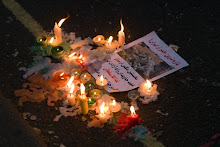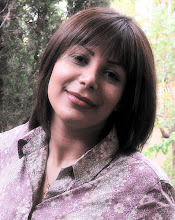Emmanuel Cooper, potter, writer, historian, teacher, friend
and mentor, died on the 21st of January, 2012. He was, and will remain, one of the
central figures in British twentieth century ceramics. He was the alchemist who
transformed studio pottery from its marginal position with of a handful posh
English blokes making wholemeal brown stoneware and a sprinkling of precious
pottery ladies pursuing a wholesome hobby in the garden shed, to the fully
fledged, vibrant, professional craft that it now is, thriving in the art world
and imposing itself on the reluctant consciousnesses of the literati and
media-ristocracy.
In 1970, with Eileen Lewenstein, he founded Ceramic Review,
which evolved into one of the most respected art magazines on the market with
an international readership and profile. As a historian and glaze technician he
was second to none. Go into the studio of any working potter and you will find
at least one of his books, if not the dictionary of glaze recipes, then one of
the histories. He did not restrict his research and writing to ceramics. His
publications include: ‘Fully Exposed: Male Nude in Photography,’ (1995), ‘People’s
Art: Working Class Art from 1750 to the Present Day,’ (1991), and, ‘The Sexual
Perspective: Homosexuality and Art in the Last 100 Years in the West,’
(1994). He brought this extensive
knowledge to his writing and teaching. Under his influence ceramics became a
discipline able to flourish in a contemporary art context. Without Emmanuel
Cooper, we probably would not have either Grayson Perry or Edmund de Waal, at
least not as we know them. Both, doubtless would be successful artists and de
Waal, in particular, would still be a potter and writer but their work would
have so much less meaning and resonance. Perry would not have his adversarial
opposite which would deny his work much of it’s ‘charge,’ (his word), and de
Waal, too would lack an opposing context – his would be a much lonelier body of
work.
Cooper was born in 1938 and during his early years, during
the post-war era, studio pottery, under the auspices of Bernard Leach, grew
steadily. It become fashionable in the1960s when the quasi-rustic, back to
nature aesthetic was part of an anti-establishment life-style. Numerous potters
associations sprung up, sharing information and resources, each with its own
newsletter, annual conference and exhibition. There was a corresponding growth
in availability and quality of materials as the industry reached out to the
burgeoning market of hobbyists. Classes mushroomed and potters acquired an
increasingly professional training. In the midst of this maelstrom of activity,
was Emmanuel Cooper who had that rare and extraordinary gift of being able to
connect across the full range of makers and designers that emerged during this
period. From the most conservative makers of garden and tableware, toiling in
barns in the rural shires, to the most outré and rarefied of post modern
academicians, producing dusty ‘installations,’ and museum ‘interventions,’ he
inspired equal respect and affection in us all.
Cooper the potter was tenaciously 'urban.' He developed a range of glazes tailored to the needs of urban surroundings, in particular the use of a compact electric kiln. Not for him the roar, smoke and melodramatics of the wood-fired beasts beloved by rural potters. I will always think of Emmanuel Cooper pots as either bowls or jugs, but primarily as shapes which could show off his latest glaze like some kind of grand new apparel, a volcanic swathe of blistering, bubbling colour - usually a monochrome but rarely the same thing twice. Delicate and elegant, they were and are instantly recognisable as his.
Cooper the potter was tenaciously 'urban.' He developed a range of glazes tailored to the needs of urban surroundings, in particular the use of a compact electric kiln. Not for him the roar, smoke and melodramatics of the wood-fired beasts beloved by rural potters. I will always think of Emmanuel Cooper pots as either bowls or jugs, but primarily as shapes which could show off his latest glaze like some kind of grand new apparel, a volcanic swathe of blistering, bubbling colour - usually a monochrome but rarely the same thing twice. Delicate and elegant, they were and are instantly recognisable as his.
Emmanuel Cooper was true democrat, a unifier among the
cliques and factions which so often proliferate in marginal subcultures. He
diversified the discipline in all senses of the word, bringing together industry and
studio, academics and makers, and above all, consistent with his egalitarian
activist politics, he brought in people from all backgrounds
ensuring that it could grow beyond the effete circle of posh blokes in sheds
which characterised the early years, and become the highly respected art form it
now is, one in which we can all be proud to participate. In a word, he is irreplaceable. In his case, the cliches are right: it is the end of an era and we probably will not see his like again, but that does not need to be a reason to mourn. Rather we can celebrate his colossal legacy and build on it. There could be no better way to honour his extraordinary life and work.












































No comments:
Post a Comment